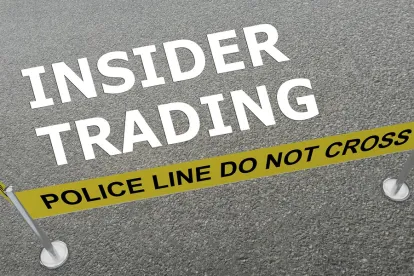The Second Circuit recently took an unexpected plunge into the torrid waters of insider trading law. Following several years of decisions limiting the government’s broad interpretation of what constitutes a personal benefit in order to convict on insider trading charges, the Court has now done what might be considered an about-face. In United States v. Blaszczak, No. 18-2825 (2d Cir. Dec. 30, 2019) (“Blaszczak”), the Court refused to apply any personal benefit test whatsoever to insider trading charges brought under Title 18. As such, Blaszczak may well become powerful precedent for prosecutors seeking to lower the bar for insider trading prosecutions.
Blaszczak, who had previously worked at the Centers for Medicare & Medicaid Services (“CMS”), provided confidential information from that agency to his hedge fund clients. The information provided the timing and substance of upcoming proposed CMS rule changes (the “Information”), which the hedge funds used to short stock in certain healthcare companies that would be negatively affected by the rule change. Blaszczak and several other defendants were indicted on multiple charges, including insider trading charges brought under both Title 15 (15 U.S.C. § 78j(b)) and Title 18 (18 U.S.C. § 1348). At trial, the court refused the defendants’ request to include the personal benefit test in the jury instructions for both the Title 15 and Title 18 charges, including it only for the Title 15 instructions. Defendants were acquitted of the Title 15 charges, but convicted on the Title 18 charges. Notably, the Court’s opinion makes no reference to any personal benefit the tipping defendant may have received in exchange for the Information. The defendants’ acquittal under the Title 15 charges suggests whatever evidence of a personal benefit was presented, if any, was not persuasive.
The test itself requires prosecutors to show that a tipper obtained a personal benefit through the disclosure of confidential information in order to charge the tipper or the tippee with insider trading. See Dirks v. S.E.C., 463 U.S. 646 (1983) (“Dirks”). In Blaszczak, however, the Second Circuit specifically held that the personal benefit test did not apply to insider trading charges brought under Title 18; it only applied to charges brought under Title 15 (securities fraud provisions under the Securities Exchange Act, 15 U.S.C. § 78j(b)). The Court noted that, while the securities fraud offences under both Title 18 and Title 15 share similar text and proscribe similar theories of insider trading (namely, those akin to embezzlement), neither mentions a personal benefit test. Rather,
the personal-benefit test is a judge-made doctrine premised on the Exchange Act’s statutory purpose. As Dirks explained, in order to protect the free flow of information into the securities markets, Congress enacted the Title 15 fraud provisions with the limited “purpose of . . . eliminat[ing] [the] use of inside information for personal advantage.” Dirks effectuated this purpose by holding that an insider could not breach his fiduciary duties by tipping confidential information unless he did so in exchange for a personal benefit.
Blaszczak at 28 (quoting Dirks at 662) (emphasis in original). With this “unteathering” of the personal benefit test “from the statutory context in which it arose,” the Court was then free not to apply the test to the Title 18 insider trading charges. Instead, the Court held that, in the context of embezzlement,
there is no additional requirement that an insider breach a duty to the owner of the property, since it is impossible for a person to embezzle the money of another without committing a fraud upon him. Because a breach of duty is thus inherent in [this] formulation of embezzlement, there is likewise no additional requirement that the government prove a breach of duty in a specific manner, let alone through evidence that an insider tipped confidential information in exchange for a personal benefit.
Blaszczak at 29-30. This argument that the duty is “inherent” in embezzlement may be clear in the context of objectively valuable property, like money. However, it becomes hazier the further one gets from an objective standard of value. Here, Blaszczak was able to discover pre-decisional information about pending CMS rules. This is not objectively valuable information. As Judge Kearse pointed out in a strong dissent, the Information was pre-decisional, meaning it was subject to change, and could not have an economic impact on the government until after CMS actually has decided which rules to adopt. Moreover, the Information was not property that CMS valued because “CMS is not a business . . . it is a regulatory agency” and “information is not CMS’s ‘stock in trade.’” Despite the dubious value of the Information, the Second Circuit effectively found that Blasczak breached an inherent duty to CMS in tipping the Information to another.
As litigants start to grapple with the consequences of Blasczak, the full impact of the decision remains to be seen. But there is no doubt that Blaszczak has the potential to remarkably expand insider trading liability. First, while the case dealt with pre-decisional information from a government agency, it is not difficult to imagine its holding extending to any case where a tipper receives non-public government information. Second, Blaszczak eliminates a significant prosecutorial hurdle by allowing insider trading charges to proceed against both tippers and tippees, even where the tipper did not receive a clear personal benefit in exchange for the tip.




 />i
/>i

